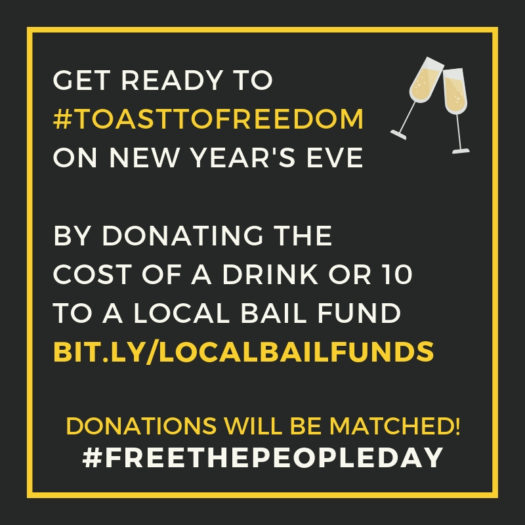It’s National #FreeThePeopleDay on New Year’s Eve…
Updated in 2018
Directory: bit.ly/localbailfunds
This list of local community bail funds includes the forty-plus funds that are part of the National Bail Fund Network. These community bail and bond funds are doing the daily work of freeing people by paying bail/bond and are also fighting to abolish the money bail system and pretrial detention. Note that this directory is currently limited to community bail funds that are regularly paying bail/bond within the criminal legal or immigration detention systems for community members as their central action.
The directory does not include the many legal defense funds that allied organizations hold that may include bail support and the numerous community-based organizations that periodically pay for bail and bond.
From 2017…
As is my custom, I fired off a tweet this morning and then I was like, hey this might be a good idea :).
Instead of tomorrow being New Year’s Eve, I’m renaming it National Free The People Day. Donate the amount you’re going to spend on one drink to a community bail fund/effort. [I just made this up, LOLOL! But let’s go with it]. You can still drink too 😂😂😂
— Louise Patterson Stan (@prisonculture) December 30, 2017
I’ve been supporting efforts to #EndMoneyBail and #EndPreTrialDetention for years. There is some progress being made on both fronts. I want to particularly lift up the efforts of the Chicago Community Bond Fund (full disclosure: I’m a founding advisory board member). You can read our end of year report here to learn more.
If you are interested in participating in National #FreeThePeople Day Bailout on New Year’s Eve, you can donate the cost of a drink (or more) to a community bail fund or effort. To help, I am sharing some local funds and efforts. I’ll begin by sharing the ones I’m actually familiar with and have donated to in 2017.
1. Chicago Community Bond Fund
2. Massachusetts Bail Fund (your donations are DOUBLED through 12/31)
3. National Bail Out (your donations are DOUBLED through 12/31)
4. Philadelphia Community Bail Fund
The following are bail funds that I am familiar with but did not donate money to this year.
4. Brooklyn Community Bail Fund (your donations are DOUBLED through 12/31)
6. Richmond Community Bail Fund
Here are some other local bail funds/efforts.
8. Memphis Community Bail Fund
9. Northwest Community Bail Fund
11. Louisville Community Bail Fund
12. Tuscon Second Chance Community Bail Fund
13. Free the 350 Bail Fund (Wisconsin)
15. Eastern Iowa Community Bond Project
16. Nashville Community Bail Fund
17. Columbia County Bail Fund (NY)
Also there’s a great app called Appolition that will round up your small change and donate it to the National Bail Out. More details about the app are in this recent article. You can sign up for Appolition here.
The New Inquiry has developed Bail Bloc which is a cryptocurrency project against bail. You have to download some software onto your computer. Don’t ask me how this works but it apparently does and it costs nothing but electricity to power your computer (?) to participate. Read more here.
Thank you for your interest in helping to free people from jails across the country. Let’s put this last day of 2017 to good use. If you donate, let others know through the #FreeThePeopleDay hashtag.

